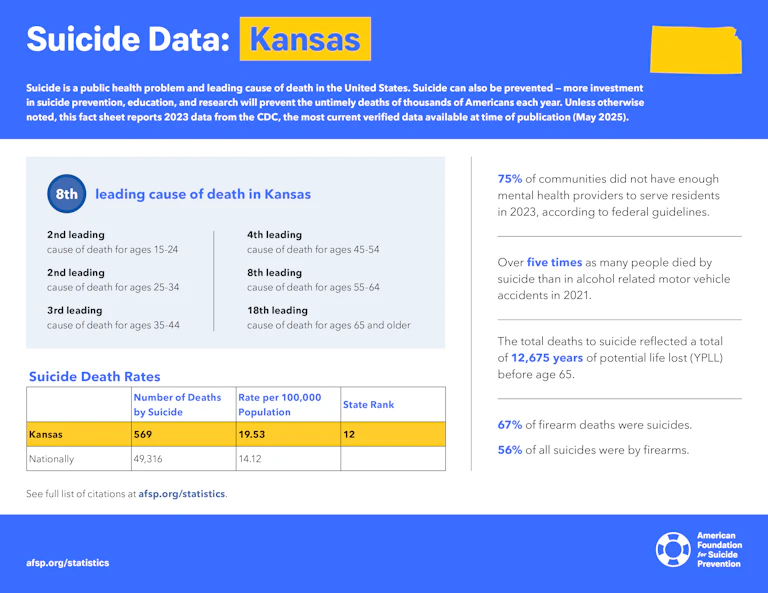Kansas

Kansas suicide prevention plans and initiatives
The Kansas Department of Aging and Disability Services, Behavioral Health Services Commission (KDADS/BHS) houses the State Suicide Prevention Coordinator to lead state suicide prevention efforts and is charged with building public-private partnerships to develop and accomplish its suicide prevention goals and objectives. Most recently, KDADS published the Kansas Suicide Prevention Plan: 2021-2025, which will be renewed every 5 years with progress reports submitted to the GBHSPC and the state legislature or Governor annually.
In 2018, the Office of the Kansas Attorney General (AG) and Tower Mental Health Foundation convened a Mental Health Task Force, and that December released the Kansas Youth Suicide Prevention Task Force State Report recommending access to mental health services, suicide prevention training in schools, and a full-time suicide prevention coordinator position. In 2019 Kansas law charged the AG with appointing said coordinator to identify, create, coordinate, and support youth suicide awareness and prevention efforts statewide (K.S.A. § 75-772); a youth suicide prevention coordinator position also exists in the Office of the AG.
Kansas laws
Key:
- Required by law
- Encouraged by law
- No law in place
Crisis lines and 988 implementation
- Addresses 988 infrastructure and provides for telecom user fee
- Addresses 988 infrastructure but does not include telecom user fee
- 988 law limited to creating an exploratory commission, advisory committee, or task force
Mental health parity
- Public health plans (e.g., Medicaid) regularly submit parity compliance analyses to state regulators
- Private health plans (individual and group) regularly submit parity compliance analyses to state regulators
K – 12 school suicide prevention
- Inclusion of the 988 Suicide & Crisis Lifeline and/or other crisis line(s) on student ID cards
- Student allowances for excused mental health absences
- School personnel must report student suicide risk to a parent and/or guardian
- Suicide prevention and/or mental health training for certain school personnel, annual
- Suicide prevention and/or mental health training for certain school personnel, not annual
- Suicide prevention, intervention, and postvention policies/programming
- Student education on suicide prevention
Health professional training in suicide assessment, treatment and management
- Mental health professionals receive regular training
- Mental health professionals receive one time training
- Medical/surgical professionals receive regular training
- Medical/surgical professionals receive one time training
Conversion therapy bans
- Prohibits licensed/board certified mental health providers from engaging in conversion therapy with minors under 18 years of age
- Prohibits licensed/board certified mental health providers from engaging in conversion therapy with vulnerable adults
- Prohibits use of state funds for any purpose related to conversion therapy (e.g., conducting, making a referral for, or extending health benefits coverage for)
University and college campus suicide prevention
- Inclusion of the 988 Suicide & Crisis Lifeline and/or other crisis line(s) on student ID cards
- Students receive information on available mental health and/or suicide prevention services and/or resources
- Adoption of suicide prevention/awareness policy or program
Firearms
- Process for extreme risk protection orders (ERPOs)
- State voluntary do not sell list